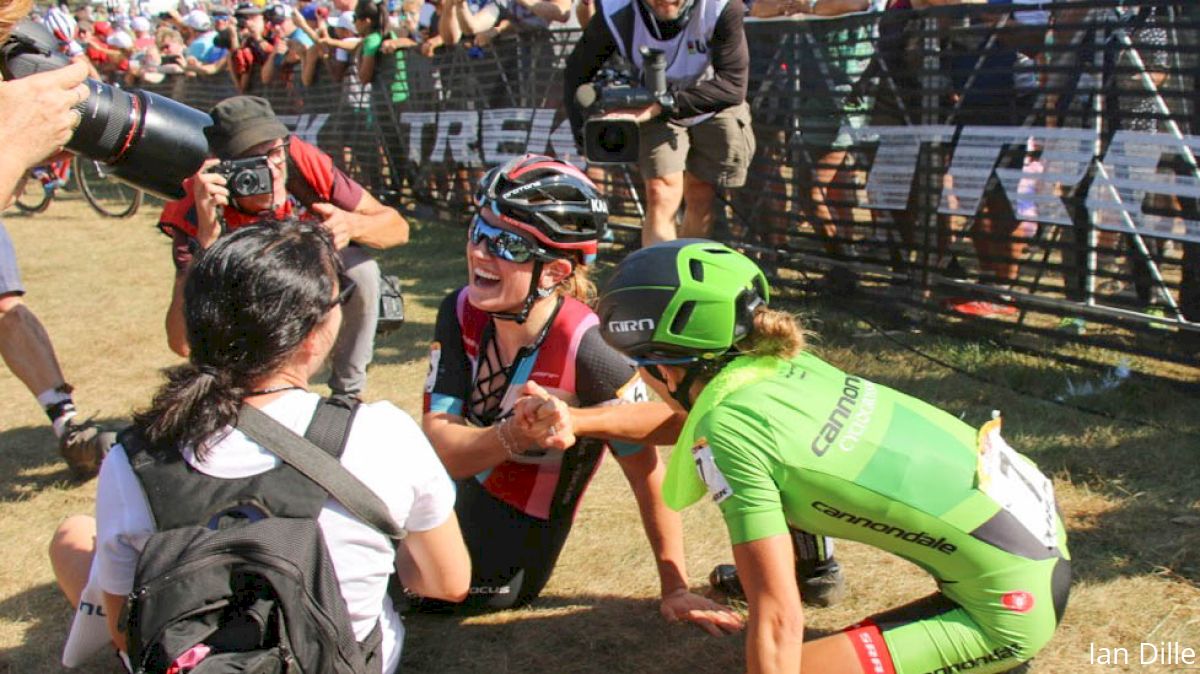Trek CEO John Burke Talks UCI Cyclocross and Corporate Culture
Trek CEO John Burke Talks UCI Cyclocross and Corporate Culture
We followed up with Trek CEO John Burke to see why the company decided to host an UCI World Cup cyclocross event.

If you attended the Trek CX Cup in Waterloo, Wisconsin — the UCI World Cup cyclocross race held at the headquarters of one of the world’s biggest bike companies — you might have felt like you were attending a backyard bike race, only with the world’s best racers.
At the event, held September 24, sculptures of life-size cows, custom-painted by the company’s Project One employees, dotted the course. The flyover was built to look like a Midwestern barn. The course’s technical section and run-up, Factory Hill, rose from the Trek headquarters loading dock. At the “Secret Bar,” in a secluded wooded area, volunteers sold PBR and Hamm’s beer. A disco ball spun, music blared, and impromptu dancing broke out.
In the wake of the World Cup, we followed up with Trek CEO John Burke to see why the company decided to host an international event, and what it meant for the company and the sport.
How did the UCI World Cup at the Trek headquarters come to fruition?
To understand something about Trek, it’s a competitive atmosphere, but this is a company made of cyclists. It’s either cyclists who came here to work, or it’s people who started to work here and became cyclists. It’s unbelievable the amount of people who ride their bikes here.
Six or seven years ago, cross became a big deal around here. Someone came up with the idea of having the CXC Cup here, and so we did that for a few years. Then Chad Brown, who’s the CFO, was like, “Dude, we should do a UCI World Cup event here.” And I’m like, “Great, go get ‘em tiger.”
We like doing that stuff. It’s not easy. But, we’re good at the hard stuff. Whether it’s the Project One painters who showed up on a Saturday morning to volunteer to paint those cows, or whether it’s 250 people who sat out there in 90-plus degree heat, we’ve got the A-team here, and I think it’s a good thing that Trek’s involved.
Is the World Cup race something that’s sustainable for your company? Do you see the race continuing at the Trek headquarters in the future?
I’ve had a lot of great days at Trek, and two of them were in the last two weeks. One was the cross race, and then the following Sunday we hosted the NICA mountain bike race for the state of Wisconsin. There were 550 kids riding their mountain bikes on our mountain bike trails. It was unbelievable.
We’ve been a sponsor of the Trek 100 that benefits the Childhood Cancer Fund for 30 years. And so I take a look at the UCI World Cup cyclocross event, and that’s not a money-maker for Trek by any stretch of the imagination, but we’ll continue to host the World Cup event.
That was an awesome event. And that was our first swing. We’re the continuous improvement company — we always do better the second time and the third time. So I think when you take a look at what we’ll be able to do with the cyclocross event next year, we’ll kill it.
More and more companies, bike companies included, are making the mental and physical health of their employees a priority. How do you see the wellness of your employees, and events like the Trek CX Cup, contributing to the company’s overall success?
I like to hold some of my meetings by walking around outside. And I was just walking around outside, and I walked through the cyclocross course, and there were like 10 people out there riding around on the trails.
For Trek, it’s been an evolution over time. But when we built the mountain bike trails here, we became more of a mountain bike company. When we bought a race team, we became more of a race company. And when we got into cross bike racing, we became more of a cross company. We really like to get ourselves immersed in the culture of cycling.
Trek’s response to the positive feedback for offering equal prize money to the elite men and women seemed to be, “Thanks, but this shouldn’t be a big deal. It should be the norm.”
I agree. Both people are putting in the same amount of effort, they’re bringing in the same amount of revenue. Why wouldn’t you offer equal prize money? We kind of have a thing around here about doing the right thing, and that just seems to make sense.